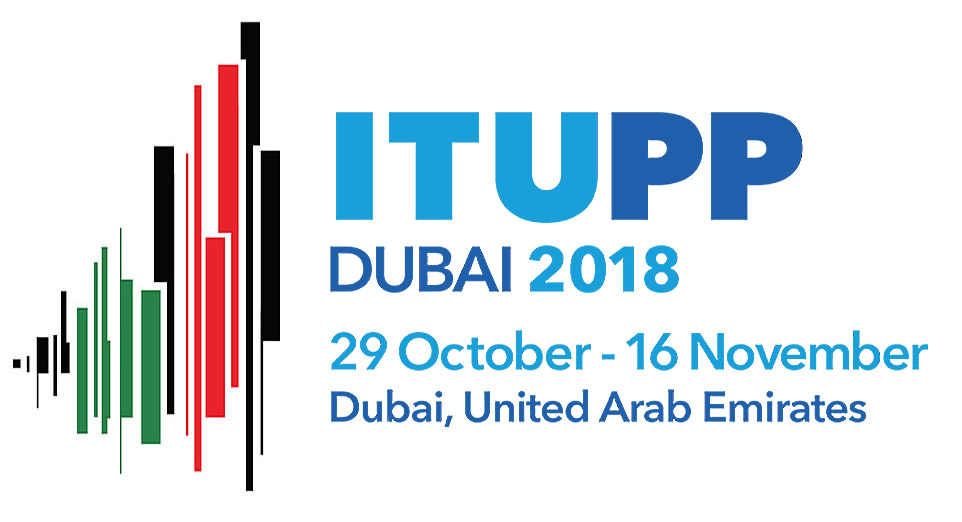Who can submit proposals?
- ITU Member States are entitled to submit proposals to the Plenipotentiary Conference, as well as the State of Palestine (Res. 99 (Rev. Busan, 2014)). However, the State of Palestine is not entitled to propose amendments to the Constitution (CS) or Convention (CV).
- Observers participating in an advisory capacity (Annex 2 to Resolution 145 (Antalya, 2006)) may submit information documents via the Secretary-General.
Deadlines to submit proposals:
28 February 2018: Deadline for submission of proposals to amend CS/CV (CS 224 / CV 519)
29 June 2018: Deadline for submission of other proposals (GR 40)
15 October 2018: Firm deadline for submission of contributions (Res. 165)
Prepare and submit your proposals:
Conference Proposals Interface (CPI): The electronic tool Conference Proposals Interface (CPI) to facilitate preparation and submission of the proposals is now made available to Member States to prepare and submit their PP-18 proposals.
Guidelines for the presentation of proposals: These guidelines have been prepared by the ITU General Secretariat for the submission of proposals, including proposed amendments to the Constitution (CS) and Convention (CV), by Member States to the forthcoming Plenipotentiary Conference (PP-18).
Proposals should be prepared and submitted via CPI*. Reference text is the Collection of basic texts of the ITU adopted by the Plenipotentiary Conference (2015 Edition). The sequential numbering system should be used to identify the particular provision to which the proposal is related. In case a Member States does not want to use CPI, a PP-18 template for proposal for ease of reference can be found here.
Member States should begin their proposals with a short summary of their views on each item. This should be followed by detailed proposals, with each proposal being followed by a brief statement of the reason for the proposed change.
Symbols to be used:
- ADD Proposal to add new text
Note: where new text is to be added within an existing paragraph or sub-paragraph, the symbol MOD should be used.
- ADD* Proposal to add existing text from elsewhere in the Collection of basic texts of the ITU
Note: it is necessary to reproduce the texts carrying the symbol (ADD).
- MOD Proposal to amend a text by addition, deletion or replacement of words or figures
Note: new words added should be underlined (underlined); words to be deleted should be crossed out (crossed out).
- (MOD) Proposal to amend a text, from an editorial point of view
- SUP Proposal to delete text
Note 1: it is not necessary to reproduce texts carrying the symbol SUP.
Note 2: where text is to be deleted from within a paragraph or sub-paragraph, the symbol MOD should be used.
- SUP* Proposal to transfer text elsewhere in the Constitution/Convention
Note: it is not necessary to reproduce texts carrying the symbol SUP*.
- NOC Text for which no change is proposed
Note: this symbol may be used to clarify that no proposals are made with respect to texts carrying this symbol. It is not necessary to reproduce texts carrying this symbol.
- NOC Proposal for a text to be maintained without change
Note: this symbol may be used when Member States wish to emphasize that a particular provision or provisions of an article should remain unchanged, e.g. Article XX may be shown as NOC but provisions AA and BB of Article XX may be shown as NOC. The reasons as to why these provisions need to be maintained without change should be given.
The above standards of presentation should be adhered to as far as possible.
Proposals should be submitted by focal points of Administrations of ITU Member States via CPI or by e-mail to the ITU PP-18 secretariat at contributions@itu.int. The ITU standard format is MS Word for Windows.
Processing of texts in the General Secretariat
If not yet done by the Member State, the General Secretariat will annotate the individual proposals with index numbers composed as follows:
ABC/25/3
where ABC is the symbol of the country, that is the author of the proposal (according to the Preface to the International Frequency List), 25 is the number of the document in which the proposal is published and 3 is the serial number of the proposal within that document.
Conclusion
The main purpose of these guidelines is to enhance the timely processing for distribution as well as coordination of proposals submitted by Member States and thus to facilitate the work of the Conference. These guidelines, if followed by Member States, will enable the secretariat at ITU headquarters to carry out its work in a more efficient and effective manner and avoid extra costs with respect to the budget of the Conference.
See also the ITU English Language Style Guide.
